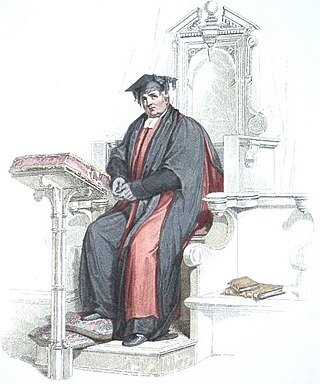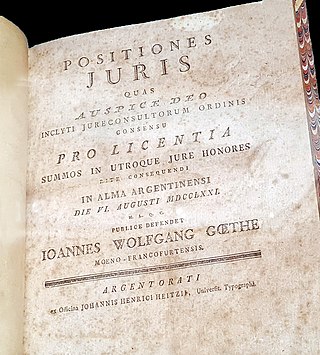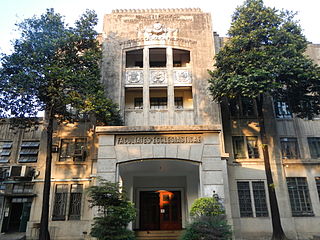
A seminary, school of theology, theological college, or divinity school is an educational institution for educating students in scripture and theology, generally to prepare them for ordination to serve as clergy, in academics, or mostly in Christian ministry.

A Doctor of Divinity is the holder of an advanced academic degree in divinity. The term is more common in the English-speaking world than elsewhere. In the United Kingdom and Ireland, the DD is usually a higher doctorate conferred upon a religious scholar of standing and distinction, usually for accomplishments beyond the PhD or ThD level. In the United States, the DD is generally an honorary degree. In Catholic universities, faculties of theology usually grant the degree of Doctor of Sacred Theology (STD), but the DD may be awarded as an honorary degree.
For graduate-level theological institutions, the Master of Divinity is the first professional degree of the pastoral profession in North America. It is the most common academic degree in seminaries and divinity schools.

Licentiate in Sacred Theology is the second of three ecclesiastical degrees in theology which are conferred by a number of pontifical faculties around the world. The licentiate comes with attendant canonical effects in the Catholic Church, specifically granting the holder the right to teach in Catholic seminaries and schools of theology.

A licentiate is an academic degree present in many countries, representing different educational levels. It may be similar to a master's degree when issued by pontifical universities and other universities in Europe, Latin America, and Syria.
In Western universities, a Bachelor of Divinity or Baccalaureate in Divinity is an academic degree awarded for a course taken in the study of divinity or related disciplines, such as theology or, rarely, religious studies.

Doctor of Theology is a terminal degree in the academic discipline of theology. The ThD, like the ecclesiastical Doctor of Sacred Theology, is an advanced research degree equivalent to the Doctor of Philosophy.
Master of Theology is a post-graduate degree offered by universities, divinity schools, and seminaries. It can serve as a transition degree for entrance into a PhD program or as a stand-alone terminal degree depending on one's particular educational background and institution of study. In North America, the Th.M. typically requires at least three years of prerequisite graduate study for entrance into the program, typically a Master of Divinity or equivalent.
The Doctor of Sacred Theology, also sometimes known as Professor of Sacred Theology, is the final theological degree in the pontifical university system of the Catholic Church, being the ecclesiastical equivalent of the academic Doctor of Theology (ThD) degree.
The Bachelor of Theology degree is a two- to five-year undergraduate degree or graduate degree in theological disciplines and is typically pursued by those seeking ordination for ministry in a church, denomination, or parachurch organization. Candidates for this degree typically must complete course work in Greek and (or) Hebrew, as well as systematic theology, biblical theology, ethics, homiletics, hermeneutics, counseling and Christian ministry. The Bachelor of Theology may include a thesis component and may consist of an additional year beyond the coursework requirements for the degrees of Bachelor of Religious Education and Bachelor of Arts. In some denominations, such as the Church of England or the Presbyterian Church in America, it is considered sufficient qualification for formal ordination.

Christ College, formerly known as the Presbyterian Theological Centre, is the theological college of the Presbyterian Church of Australia in New South Wales. It provides theological education for ministry candidates and members of the laity. It is an approved teaching institution of the Australian College of Theology.
Boston University School of Theology (STH) is the oldest theological seminary of American Methodism and the founding school of Boston University, the largest private research university in New England. It is one of thirteen theological schools maintained by the United Methodist Church. BUSTH is a member of the Boston Theological Institute consortium.
Perkins School of Theology is one of Southern Methodist University's three original schools and is located in Dallas, Texas. The theology school was renamed in 1945 to honor benefactors Joe J. and Lois Craddock Perkins of Wichita Falls, Texas. Degree programs include the Master of Divinity (M.Div.), Master of Sacred Music, Master of Theological Studies (MTS), Master of Arts in Ministry, Master of Theology (Th.M.), Doctor of Ministry (D.Min.), and Doctor of Pastoral Music as well as the Ph.D., in cooperation with The Graduate Program in Religious Studies at SMU’s Dedman College of Humanities and Sciences. It is one of only five university-related theological institutions of the United Methodist Church, and one of the denomination's 13 seminaries, offering opportunities for interdisciplinary learning, and accredited by the Association of Theological Schools (ATS). There is a hybrid-extension program in Houston-Galveston.
Licentiate of Canon Law is the title of an advanced graduate degree with canonical effects in the Roman Catholic Church offered by pontifical universities and ecclesiastical faculties of canon law. Licentiate is the title of a person who holds an academic degree called a licence. The licentiate of canon law is the ordinary way for forming future canonists, according to Veritatis gaudium.

Northeastern Seminary (NES) is a private Wesleyan seminary on the campus of Roberts Wesleyan University in Rochester, New York. Though it is independent and multi-denominational in its approach to theological education it has strong affiliation with the Free Methodist Church. Degrees offered are the Master of Divinity, Master of Arts, graduate-level certificates, and Doctor of Ministry; all master's degree programs are offered online. Students and graduates represent more than 30 Christian faith traditions.

St. John's Regional Seminary (Philosophate) founded in 1987 is a propaedeutic seminary equipping students with philosophical training. It is located in the rural town of Kothavalasa in the Vizianagaram District in Andhra Pradesh, India.

The University of Santo Tomas Faculties of Ecclesiastical Studies are the ecclesiastical schools of the University of Santo Tomas, the oldest and the largest Catholic university in Manila, Philippines.
Africa International University is a Christian university in Karen, Nairobi, Kenya.
There are three kinds of Seminaries in India:









